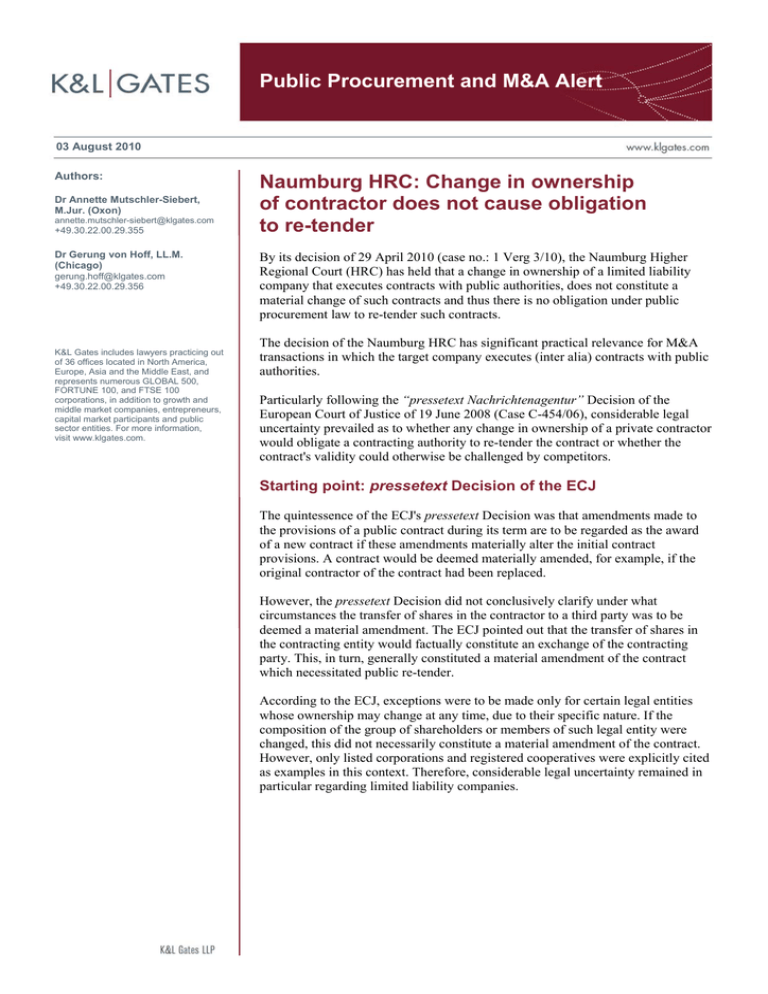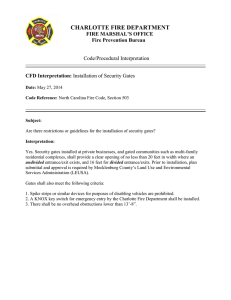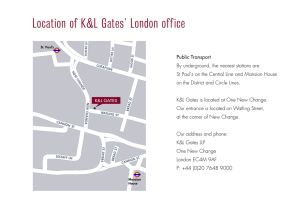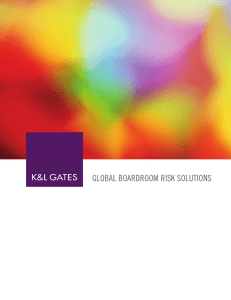
Public Procurement and M&A Alert
03 August 2010
Authors:
Dr Annette Mutschler-Siebert,
M.Jur. (Oxon)
annette.mutschler-siebert@klgates.com
+49.30.22.00.29.355
Dr Gerung von Hoff, LL.M.
(Chicago)
gerung.hoff@klgates.com
+49.30.22.00.29.356
K&L Gates includes lawyers practicing out
of 36 offices located in North America,
Europe, Asia and the Middle East, and
represents numerous GLOBAL 500,
FORTUNE 100, and FTSE 100
corporations, in addition to growth and
middle market companies, entrepreneurs,
capital market participants and public
sector entities. For more information,
visit www.klgates.com.
Naumburg HRC: Change in ownership
of contractor does not cause obligation
to re-tender
By its decision of 29 April 2010 (case no.: 1 Verg 3/10), the Naumburg Higher
Regional Court (HRC) has held that a change in ownership of a limited liability
company that executes contracts with public authorities, does not constitute a
material change of such contracts and thus there is no obligation under public
procurement law to re-tender such contracts.
The decision of the Naumburg HRC has significant practical relevance for M&A
transactions in which the target company executes (inter alia) contracts with public
authorities.
Particularly following the “pressetext Nachrichtenagentur” Decision of the
European Court of Justice of 19 June 2008 (Case C-454/06), considerable legal
uncertainty prevailed as to whether any change in ownership of a private contractor
would obligate a contracting authority to re-tender the contract or whether the
contract's validity could otherwise be challenged by competitors.
Starting point: pressetext Decision of the ECJ
The quintessence of the ECJ's pressetext Decision was that amendments made to
the provisions of a public contract during its term are to be regarded as the award
of a new contract if these amendments materially alter the initial contract
provisions. A contract would be deemed materially amended, for example, if the
original contractor of the contract had been replaced.
However, the pressetext Decision did not conclusively clarify under what
circumstances the transfer of shares in the contractor to a third party was to be
deemed a material amendment. The ECJ pointed out that the transfer of shares in
the contracting entity would factually constitute an exchange of the contracting
party. This, in turn, generally constituted a material amendment of the contract
which necessitated public re-tender.
According to the ECJ, exceptions were to be made only for certain legal entities
whose ownership may change at any time, due to their specific nature. If the
composition of the group of shareholders or members of such legal entity were
changed, this did not necessarily constitute a material amendment of the contract.
However, only listed corporations and registered cooperatives were explicitly cited
as examples in this context. Therefore, considerable legal uncertainty remained in
particular regarding limited liability companies.
Public Procurement and M&A Alert
Naumburg HRC
+
In its recent decision, which is both pragmatic
and in line with the legal doctrine, Naumburg
HRC held that the exception stipulated by the
ECJ for changes of shareholders of listed
corporations and registered limited liability
cooperatives also applied to a change of
ownership of a limited liability company.
contractual relationships. As far as M&A is
concerned, legal certainty will significantly
increase with regard to share deals where the
target company executes public contracts. Asset
deals, however, will most likely continue to be
relevant under public procurement law, as a
transfer of contract entails the factual exchange
of the contracting entity. Transactions involving
the restructuring of a contracting entity under the
German Transformation Act (Umwandlungsgesetz) will still have to be assessed on a case by
case basis as to establish whether they are
relevant under public procurement law.
There was no objective reason to differentiate
between a change of shareholders in a listed
company on the one hand, and changes in the
ownership of a limited liability company on the
other. As long as a company was organized as a
corporate entity, that is, independent of its
existing members, its shares were transferable,
without triggering obligations under public
procurement law.
The Court rightly raised the concern that if every
change in ownership of a legal entity were to
cause re-tender obligations, its shares would be
difficult to trade and it would become virtually
impossible to award a public contract to a
corporate entity at all.
This is the first time that a German Higher
Regional Court has expressly held that a change
of ownership in a limited liability company with
contractual relationships with public entities is
irrelevant under public procurement law and thus
does not raise concerns with regard to existing
Naumburg HRC's decision is very welcome as it
increases legal certainty in this field of law.
However, given that the decision, in its scope of
relevance and clarity, goes beyond the pressetext
Decision of the ECJ, it may well be that the latter
might have the final say in possible future
proceedings.
For further information please contact:
Dr Friedrich Ludwig Hausmann
friedrich.hausmann@klgates.com
+49.30.22.00.29.350
Dr Annette Mutschler-Siebert, M.Jur. (Oxon)
annette.mutschler-siebert@klgates.com
+49.30.22.00.29.355
Anchorage Austin Beijing Berlin Boston Charlotte Chicago Dallas Dubai Fort Worth Frankfurt Harrisburg Hong Kong London
Los Angeles Miami Moscow Newark New York Orange County Palo Alto Paris Pittsburgh Portland Raleigh Research Triangle Park
San Diego San Francisco Seattle Shanghai Singapore Spokane/Coeur d’Alene Taipei Tokyo Warsaw Washington, D.C.
K&L Gates includes lawyers practicing out of 36 offices located in North America, Europe, Asia and the Middle East, and represents numerous
GLOBAL 500, FORTUNE 100, and FTSE 100 corporations, in addition to growth and middle market companies, entrepreneurs, capital market
participants and public sector entities. For more information, visit www.klgates.com.
K&L Gates is comprised of multiple affiliated entities: a limited liability partnership with the full name K&L Gates LLP qualified in Delaware and
maintaining offices throughout the United States, in Berlin and Frankfurt, Germany, in Beijing (K&L Gates LLP Beijing Representative Office),
in Dubai, U.A.E., in Shanghai (K&L Gates LLP Shanghai Representative Office), in Tokyo, and in Singapore; a limited liability partnership (also
named K&L Gates LLP) incorporated in England and maintaining offices in London and Paris; a Taiwan general partnership (K&L Gates)
maintaining an office in Taipei; a Hong Kong general partnership (K&L Gates, Solicitors) maintaining an office in Hong Kong; a Polish limited
partnership (K&L Gates Jamka sp. k.) maintaining an office in Warsaw; and a Delaware limited liability company (K&L Gates Holdings, LLC)
maintaining an office in Moscow. K&L Gates maintains appropriate registrations in the jurisdictions in which its offices are located. A list of the
partners or members in each entity is available for inspection at any K&L Gates office.
This publication is for informational purposes and does not contain or convey legal advice. The information herein should not be used or relied
upon in regard to any particular facts or circumstances without first consulting a lawyer.
©2010 K&L Gates LLP. All Rights Reserved.
03 August 2010
2





